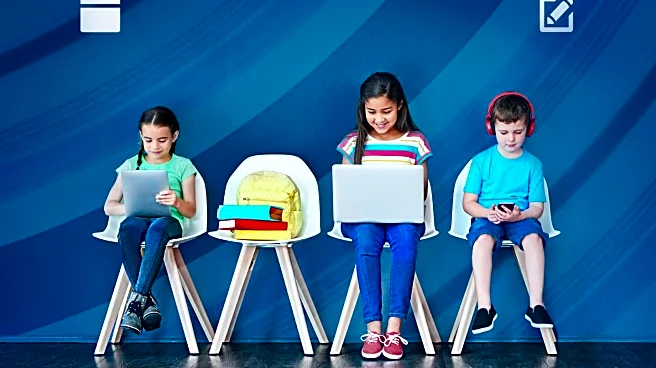What's Happening?
Recent observations indicate a significant decline in children's reading habits, attributed to the increasing prevalence of digital screens and changes in educational methods. Parents and educators have noted that children are less inclined to read for pleasure, with many preferring the instant gratification offered by digital devices. This trend has been exacerbated by the COVID-19 pandemic, which shifted many students to virtual learning environments, further increasing screen time. The focus on phonics in education, while beneficial for decoding skills, has overshadowed the importance of reading comprehension and critical thinking. As a result, students are becoming proficient in decoding text but lack the deeper comprehension skills necessary for true literacy.
Why It's Important?
The decline in reading habits among children has significant implications for their educational development and future opportunities. Reading is crucial for vocabulary expansion, critical thinking, and understanding complex concepts. Without these skills, students may struggle academically and miss out on the cognitive benefits that reading provides. The shift towards digital media and the reduction in comprehensive reading instruction could lead to a generation less equipped to engage with complex texts and ideas. This trend poses a challenge for educators and policymakers who must balance the benefits of technology with the need to foster a love for reading and comprehension skills in students.
What's Next?
To address this issue, educators and parents are encouraged to find a balance between phonics instruction and opportunities for reading comprehension and critical thinking. Schools may need to integrate more comprehensive reading strategies into their curricula, while parents can support literacy by modeling good reading habits and encouraging reading at home. Public libraries can also play a role by offering programs that make reading engaging and accessible. The challenge lies in incentivizing children to read by connecting them with materials that align with their interests, whether in print or digital formats.
Beyond the Headlines
The decline in reading habits among children also raises concerns about long-term cultural and intellectual impacts. As reading is a key component of cultural literacy and personal development, a decrease in reading engagement could affect how future generations understand and interact with the world. This shift may also influence the publishing industry and the types of content that are produced and consumed. Addressing this issue requires a multifaceted approach that considers the role of technology, educational practices, and cultural attitudes towards reading.











